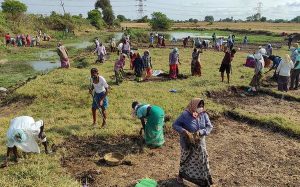02 Nov MGNREGA: its Importance and Shortage of Fund (GS 3, Economics, The Hindu, Indian Express)
News/ Context: That as many as 21 of 35 States/UTs have utilised, by October 29, over 100% of their allocated funds under the Mahatma Gandhi Rural Employment Guarantee Scheme (MGNREGS) for FY2021-22 is not a surprise. In the previous year, the allocations for MGNREGS were increased by ₹50,000 crore to meet the demand for work, with the Revised Estimates for spending for the scheme going up to ₹1,11,500 crore. MGNREGS was a life-saver for the poor, especially migrant labourers, following the sudden lockdown announced by the Union government. In this year’s Budget, the Finance Minister allocated ₹73,000 crore for the scheme, which was higher than the previous year’s absolute number in Budget allocations, but this amounted only to 2.1% of the Budget expenditure, the lowest outlay in those terms in the last six years. By October-end, Kerala, Tamil Nadu, Andhra Pradesh and Himachal Pradesh had utilised more than 130% of their respective allocations for the scheme, indicating the extent to which rural workers depend on the scheme even in relatively better-off States. Clearly, the Union government has underestimated the demand for work under the scheme, which even if it involves arduous and menial labour has accounted for a large chunk of rural employment at a time when the economy suffered a steep contraction due to the effects of the pandemic.
States are witnessing rising demand for work and wages in rural India. Civil society activists claim that some workers have been turned away by officials despite the demand for work because of the paucity of funds. The Union Government must ensure that the allocation is adequate for wage payments to be done and for demand to be met in the remaining months of this financial year. The utility of MGNREGS as a scheme that alleviates distress has never been in question. From acting as an effective substitute in the absence of crop and weather insurance in aiding poor farm households and helping to provide wages during agrarian crises, to being an avenue for employment during the economic crisis induced by the pandemic and the response, MGNREGS has turned out to be a salve for farm workers and labourers. Delays in wage payments could also result in a decline in rural consumption, which plays a vital role in stimulating the economy. Besides the scheme’s utility in distress, it also has the potential, if works are upgraded suitably, to continue to improve rural development and infrastructure. The Union Government must consider this during allocations and not be conservative in its outlay or remain unmindful of the overall potential of the scheme.
What is MGNREGA all about : The Mahatma Gandhi National Rural Employment Guarantee Act (MGNREGA), also known as Mahatma Gandhi National Rural Employment Guarantee Scheme (MNREGS) is Indian legislation enacted on August 25, 2005. The MGNREGA provides a legal guarantee for one hundred days of employment in every financial year to adult members of any rural household willing to do public work-related unskilled manual work at the statutory minimum wage. The Ministry of Rural Development (MRD), Govt of India is monitoring the entire implementation of this scheme in association with state governments
-
This act was introduced with an aim of improving the purchasing power of the rural people, primarily semi or un-skilled work to people living below poverty line in rural India. It attempts to bridge the gap between the rich and poor in the country. Roughly one-third of the stipulated work force must be women.
-
Adult members of rural households submit their name, age and address with photo to the Gram Panchayat. The Gram Panchayat registers households after making enquiry and issues a job card. The job card contains the details of adult member enrolled and his /her photo. Registered person can submit an application for work in writing (for at least fourteen days of continuous work) either to Panchayat or to Programme Officer.
-
The Panchayat/Programme officer will accept the valid application and issue dated receipt of application, letter providing work will be sent to the applicant and also displayed at Panchayat office. The employment will be provided within a radius of 5 km: if it is above 5 km extra wage will be paid.
What Activities are covered: Union Rural Development Ministry has notified works under MGNREGA, majority of which are related to agricultural and allied activities, besides the works that will facilitate rural sanitation projects in a major way.
-
The works have been divided into 10 broad categories like Watershed, Irrigation and Flood management works, Agricultural and Livestock related works, Fisheries and works in coastal areas and the Rural Drinking water and Sanitation related works.
-
Briefing the MGNREGA 2.0 (the second generation reforms for the rural job scheme) the priority of the works will be decided by the Gram Panchayats in meetings of the Gram Sabhas and the Ward Sabhas.
-
The Rural development also informed that the 30 new works being added in the Schedule 1 will also help the
-
Rural sanitation projects, as for the first time toilet building, soak pits and solid and liquid waste management have been included under MGNREGA. Though the overall 60:40 ratio of labour and material component will be maintained at the Gram Panchayat level but there will be some flexibility in the ratio for certain works based on the practical requirements.
-
Construction of AWC building has been included as an approved activity under the MGNREG Act. ‘Guidelines for construction of Anganwadi Centres’ under MGNREGS have been issued jointly by Secretary, WCD and Secretary, Ministry of Rural Development, on 13th August, 2015. Under MGNREGS, expenditure up to Rs.5 lakh per AWC building for construction will be allowed. Expenditure beyond Rs. 5 lakh per AWC including finishing, flooring, painting, plumbing, electrification, wood work, etc. will be met from the ICDS funds.
Md Layeeque Azam, Economics Faculty
Plutus IAS Current Affairs Team Member




No Comments